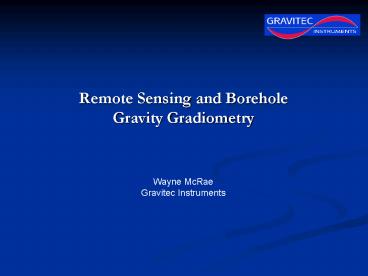Remote Sensing and Borehole Gravity Gradiometry - PowerPoint PPT Presentation
1 / 18
Title:
Remote Sensing and Borehole Gravity Gradiometry
Description:
Remote Sensing ? Purpose and Techniques. Ribbon Gravity Gradiometer ? What is it? How does it work? ... Principles of the Ribbon Gradiometer. Sensor Characteristics ... – PowerPoint PPT presentation
Number of Views:321
Avg rating:3.0/5.0
Title: Remote Sensing and Borehole Gravity Gradiometry
1
- Remote Sensing and Borehole Gravity Gradiometry
Wayne McRae Gravitec Instruments
2
Overview
- Remote Sensing ? Purpose and Techniques
- Ribbon Gravity Gradiometer ? What is it? How
does it work? - Down a Borehole ? How far can we detect the
front? - The Borehole Sonde ? The shape of things to come
2
3
Remote Sensing The Goal
- We want to make the Earth transparent, to see the
anomalies in the ground - Core drilling is expensive, risky and time
consuming - Remote sensing locates anomalies over large
areas, quickly and cheaply
3
4
Remote Sensing Techniques
- Exploit material properties
- Residual magnetisation
- Conductivity
- Radioactivity
- Seismic response (density profiling)
- Density contrast/Gravity Gravity Gradient
4
5
Gravity Gradiometry Roland Eötvös (1848-1919)
Eötvös Unit (EU) is the unit of gravity
gradient 1 EU 1?10-9 s-2
5
6
Gravity Gradiometry Deployment Applications
- Deployment
- Mobile ground surveying
- Static ground surveying
- Airborne
- Remote underwater vehicle/submersible
- Borehole
- Satellite
- Applications
- Petroleum/Mineral Surveying
- Archaeology
- Void Detection
- Passive navigation systems
- Customs and shipping security
- Unexploded ordinance (UXO) detection
- Mapping the planets, moons and asteroids
6
7
Gravity Map of the Moon ? Lunar Prospector
spacecraft in 1998-99
http//science.nasa.gov/headlines/y2008/22may_grai
l.htm?list712745
7
8
Principles of the Ribbon Gradiometer
- Sensor Characteristics
- Ribbon forms the active component of an RF bridge
- Actuators pulse the ribbon tension, changing it
between gradient sensitive and insensitive states
(5?? 10 Hz) - RF drive monitors changes in ribbon deflection
- Pulse modulated signals from twin bridges are
demodulated to generate the gravity gradient
signal
8
9
Principles of the Ribbon Gradiometer
Gravity Gradient Profile
9
10
Borehole Modelling Near Field
Reasonable Worst CaseMaterial Density
(?) Porosity (?)Rock 2600 kg/m3 Rock
0.3Concrete 2300 kg/m3 Concrete 0.1 Fluid
1000 kg/m3Density Contrast??eff ??Rock ?
??Concrete 500 kg/m3
10
Modelling courtesy of QinetiQ, UK
11
Consider a Spherical Cow
P
r
z
?
d
11
12
Gravity Gravity Gradient of a Spherical Cow
12
13
Results from Lab Prototype
Suspended Platform
30 ? 30 mmCross section
40
kg
80
120
400 mm
200
mm
280
350
Sensor
Sensor Head
Diameter(mm)
Mass(kg)
Test Mass
Motorized Track
13
14
Results from Lab Prototype
0? case Test mass sensitive
14
15
Responsivity Rig
Gravity Gradient Simulation Rig (with Sensor
Mounted)
15
Design courtesy of QinetiQ, UK
16
Constant Amplitude Piezoelectric Driver
16
17
Borehole Modelling Far Field
17
Modelling courtesy of QinetiQ, UK
18
Borehole Modelling Far Field
18
Modelling courtesy of QinetiQ, UK
19
Borehole Tool ? Things to Come
- Borehole Tool
- Temperature 80C ? 170C
- Size 65 ? 125 mm dia.
- Magnetic field Steel casing geology (1 Gauss)
- Inclination Vertical to horizontal
- Pressure 14000 kPa ? 35000 kPa at 2000 m in
salt water or drilling fluid
19

